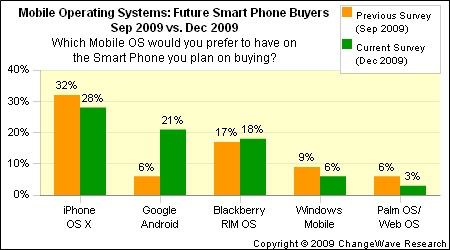By Carmi Levy, Betanews
Call me hopeful that Google's announcement of Nexus One Tuesday helps it positively influence the evolution of an open, innovative wireless market. Call me similarly hopeful that Google's move into hardware -- a bold decision that builds on its earlier success facilitating the creation of the Android mobile operating system and orchestrating the Open Handset Alliance's go-to-market plans -- will drive the success of the next truly competitive smartphone platform.
But as hopeful as I am, I'm not yet convinced that one phone can ever deliver all the goods. Nexus One is hardly the earth-shattering, apocalyptic shot that will catapult the smartphone market into next week.
While I give Google credit for managing to recreate a small fraction of the kind of gadget mania that's driven Apple fandom for much of that company's history, I feel compelled to be the guy that rains a little on everyone's parade. Yes, there's a bulging list of super-cool features -- for instance, speech input that actually works (and in virtually every major app, no less), a multi-colored trackball for customized alerts, dual-microphone noise cancellation for hands-free operation light years removed from the speaking-in-an-oil-drum experience of most current devices, and a slick interface that suddenly makes competing Android-powered devices look lame. Yet with all that, the Nexus One is hardly the "superphone" that Google claims it to be.
It's not about the device
Even if Nexus One lived up to the hype and proved itself the greatest phone in the universe, that should not be enough for Google to paste "Mission: Accomplished" on its flight deck. Gadget worship may fill the comment sections of tech sites and blogs alike, but it isn't what drives the industry. The significance of Nexus One's announcement has nothing to do with the device itself and everything to do with Google's desire -- nay, need -- to control the mobile Web services experience as thoroughly and efficiently as it controls the desktop Web services experience.
 Google is what it is today because it figured out how to monetize common online activities like search, e-mail, and productivity better than anyone else. It generates more money per unit of online end-user activity than any other Web-focused organization (Yahoo, you there?) a reality that gives it an ever growing pile of cash that allows it to invest in whatever next-generation initiatives it wants.
Google is what it is today because it figured out how to monetize common online activities like search, e-mail, and productivity better than anyone else. It generates more money per unit of online end-user activity than any other Web-focused organization (Yahoo, you there?) a reality that gives it an ever growing pile of cash that allows it to invest in whatever next-generation initiatives it wants.
Still, while Google wishes it could ride the Web-on-a-conventional-PC gravy train forever, the real world has other plans. That's because desktop and laptop PCs are yesterday's news, with growth curves flatter than a Nebraska corn field. Mobile platforms represent today's and tomorrow's explosive growth markets. Either Google converts its ability to connect advertisers with users of its services to a mobile paradigm, or it joins Microsoft and IBM in the shadowy category of companies that were once all-conquering, but retreated from their mythical status when the world changed and they failed to stay ahead of the curve.
The Android operating system was created under the auspices of the Open Handset Alliance, a Google-led 47-member consortium of hardware vendors, carriers and vendors. Android was supposed to keep Google ahead of that curve. Designed from the start to be open in the same vein as Linux, Google's goal for Android was to reduce costs to consumers, foster innovation, and accelerate the growth rate of mobile devices by driving them into markets unsustainable using conventional closed models followed by Research In Motion and Apple.
In that respect, Google has already succeeded. Since the first admittedly lukewarm HTC G1 appeared in the fall of 2008, the new OS has gained impressive momentum on a broad range of devices, and is now ideally positioned as a viable #3 to RIM and Apple. Google has kept the good times rolling with continued updates to the OS and focused investment in a development ecosystem. The result? Application availability that just powered through 20,000 titles (small compared to Apple's 100,000+, but still a respectable showing for a new player), and a fast-growing market share that research outfit Canalys pegged at 3.5% by the end of Q3 2009.
But in bringing its own phone to market, Google risks ticking off its alliance partners -- especially the mobile handset vendors like Motorola, Sony Ericsson, Samsung, and LG, all of whom signed on to the project hoping Google would remain a benevolent partner and not a ruthless competitor. If anyone's looking for evidence that Google intends to play hardball, look no further than its choice of OS for the new device. For now, Android version 2.1 is available only on the Nexus One. How many bets Google continues to favor its own devices from here on out? How many bets that Google doesn't much care if it alienates a partner or two (or three) along the way in its pursuit of mobile OS and services dominance? How many bets its hardware "partners" already have dartboards mounted in their respective boardrooms?
When Google eventually falters
With all this in mind, it's clear that while Nexus One is not the "superphone," it is more than just a phone. It's Google's bet on its future. If history is any guide, it'll turn out to be a bad bet, and Google's attempt to stay dominant for more than one computing era will fail as surely as Microsoft's attempt to navigate beyond desktop productivity and network software was. Scoff now, but when we look back 10 or 15 years from now, the leaderboard will be as radically changed as the tools and processes that will define tomorrow's business and consumer technology landscape.
Google won't disappear, of course. But the King of the Technological World mantle will have been passed because the core competencies that ensure an organization's eminence during one period of technological evolution (think mainframe, desktop, network, Internet, Web 2.0, mobile) almost never ensure eminence during subsequent periods. Like career criminals who swear they'll fly straight, we can cross our fingers and hope against hope that this time it'll be different. But ultimately, we know this is how things have to play out.
The Nexus One is already being lauded as the great phone it is. But is it in and of itself a game changer? Hardly. The game is only getting underway, and like the competitors around it, Google has many moves yet to make.
Carmi Levy is a Canadian-based independent technology analyst and journalist still trying to live down his past life leading help desks and managing projects for large financial services organizations. He comments extensively in a wide range of media, and works closely with clients to help them leverage technology and social media tools and processes to drive their business.
Copyright Betanews, Inc. 2010













 Saygus has been showing off its Android-based Vphone platform since November, so I was eager to get my hands on it to check out its noted two-way video chat capability. The CEA even gave the company an award for its innovation in low-latency 3G video chat.
Saygus has been showing off its Android-based Vphone platform since November, so I was eager to get my hands on it to check out its noted two-way video chat capability. The CEA even gave the company an award for its innovation in low-latency 3G video chat.









 Google is what it is today because it figured out how to monetize common online activities like search, e-mail, and productivity better than anyone else. It generates more money per unit of online end-user activity than any other Web-focused organization (Yahoo, you there?) a reality that gives it an ever growing pile of cash that allows it to invest in whatever next-generation initiatives it wants.
Google is what it is today because it figured out how to monetize common online activities like search, e-mail, and productivity better than anyone else. It generates more money per unit of online end-user activity than any other Web-focused organization (Yahoo, you there?) a reality that gives it an ever growing pile of cash that allows it to invest in whatever next-generation initiatives it wants.


